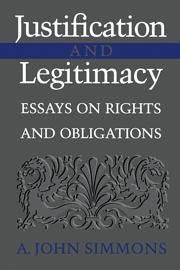Book contents
- Frontmatter
- Contents
- Introduction
- Acknowledgments
- 1 The Principle of Fair Play
- 2 Fair Play and Political Obligation: Twenty Years Later
- 3 The Obligations of Citizens and the Justification of Conscription
- 4 Associative Political Obligations
- 5 External Justifications and Institutional Roles
- 6 Philosophical Anarchism
- 7 Justification and Legitimacy
- 8 “Denisons” and “Aliens”: Locke's Problem of Political Consent
- 9 Human Rights and World Citizenship: The Universality of Human Rights in Kant and Locke
- 10 Original-Acquisition Justifications of Private Property
- 11 Historical Rights and Fair Shares
- 12 Makers' Rights
- Index
1 - The Principle of Fair Play
Published online by Cambridge University Press: 05 June 2012
- Frontmatter
- Contents
- Introduction
- Acknowledgments
- 1 The Principle of Fair Play
- 2 Fair Play and Political Obligation: Twenty Years Later
- 3 The Obligations of Citizens and the Justification of Conscription
- 4 Associative Political Obligations
- 5 External Justifications and Institutional Roles
- 6 Philosophical Anarchism
- 7 Justification and Legitimacy
- 8 “Denisons” and “Aliens”: Locke's Problem of Political Consent
- 9 Human Rights and World Citizenship: The Universality of Human Rights in Kant and Locke
- 10 Original-Acquisition Justifications of Private Property
- 11 Historical Rights and Fair Shares
- 12 Makers' Rights
- Index
Summary
The traditional consent theory account of political obligation can be understood as advancing two basic claims. (1) All or most citizens, at least within reasonably just political communities, have political obligations (that is, moral obligations or duties to obey the law and support the political institutions of their countries of residence). (2) All political obligations are grounded in personal consent (express or tacit). Today most political philosophers (and non-philosophers, I suspect) are still prepared to accept (1). But (2) has been widely rejected largely because it entails, in conjunction with (1), that all or most of us have undertaken political obligations by deliberate consensual acts. And this seems not even approximately true. If it is not true, then (1) requires a defense employing a more complex account of special rights and obligations than the one offered by consent theory.
One popular way of defending (1) relies on what has been called “the principle of fair play” (or “the principle of fairness”). Advocates of this principle argue that promises and deliberate consent are not the only possible grounds of special rights and obligations; the acceptance of benefits within certain sorts of cooperative schemes, they maintain, is by itself sufficient to generate such rights and obligations. It is these arguments I want to examine. I begin with a brief discussion of the principle of fair play as it has appeared in recent philosophical literature.
- Type
- Chapter
- Information
- Justification and LegitimacyEssays on Rights and Obligations, pp. 1 - 26Publisher: Cambridge University PressPrint publication year: 2000



